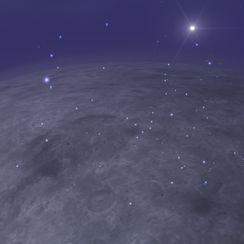
|
This wiki is closed in favour of the new wiki. Information shown is likely to be very out of date. |
Difference between revisions of "Planet Senonches"
From Discovery Wiki
Jump to navigationJump to search (Pic file fixed. Infocard link added.) |
m (Category added. new location) |
||
| Line 1: | Line 1: | ||
| − | {{Version|4. | + | {{Version|4.91}} |
{{Planet Infobox | {{Planet Infobox | ||
| name = Planet Senonches | | name = Planet Senonches | ||
| Line 5: | Line 5: | ||
| owner = | | owner = | ||
| system = [[Orleanais]] | | system = [[Orleanais]] | ||
| − | | sector = | + | | sector = 5C |
| house = {{House Link | Gallia}} | | house = {{House Link | Gallia}} | ||
| population = | | population = | ||
| Line 16: | Line 16: | ||
}} | }} | ||
Planet Senonches is located within a huge gas cloud known as the Eure Nebula. The nebula was most probably formed around the planet billions of years ago after a possible gas outburst of the [[Orleanais]] sun. The planet itself has a thin atmosphere that has no definite boundary with the surrounding nebula, and its surface is pockmarked with ancient asteroid craters that were mostly existent before the nebula was formed. | Planet Senonches is located within a huge gas cloud known as the Eure Nebula. The nebula was most probably formed around the planet billions of years ago after a possible gas outburst of the [[Orleanais]] sun. The planet itself has a thin atmosphere that has no definite boundary with the surrounding nebula, and its surface is pockmarked with ancient asteroid craters that were mostly existent before the nebula was formed. | ||
| + | |||
| + | |||
| + | [[Category: Gallia]] | ||
Revision as of 23:25, 10 December 2018
| Planet Senonches | |
| Location | 5C, Orleanais |
| Technical information | |
| Docking | No |
| Terrain | Barren |
| Diameter | 7,812 km |
| Mass | 7.40 x 10e24 kg |
| Temperature | -110°C to 5°C |
| Escape velocity | 7.42 km/sec |
Planet Senonches is located within a huge gas cloud known as the Eure Nebula. The nebula was most probably formed around the planet billions of years ago after a possible gas outburst of the Orleanais sun. The planet itself has a thin atmosphere that has no definite boundary with the surrounding nebula, and its surface is pockmarked with ancient asteroid craters that were mostly existent before the nebula was formed.
